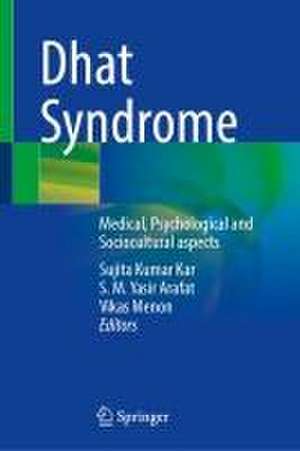Dhat Syndrome: Medical, Psychological and Sociocultural aspects
Editat de Sujita Kumar Kar, S. M. Yasir Arafat, Vikas Menonen Limba Engleză Hardback – 14 mar 2024
Preț: 1032.64 lei
Preț vechi: 1086.99 lei
-5% Nou
Puncte Express: 1549
Preț estimativ în valută:
197.62€ • 205.56$ • 163.15£
197.62€ • 205.56$ • 163.15£
Carte disponibilă
Livrare economică 24 martie-07 aprilie
Preluare comenzi: 021 569.72.76
Specificații
ISBN-13: 9789819988693
ISBN-10: 9819988691
Pagini: 176
Ilustrații: XIII, 176 p. 10 illus. in color.
Dimensiuni: 155 x 235 mm
Greutate: 0.45 kg
Ediția:2024
Editura: Springer Nature Singapore
Colecția Springer
Locul publicării:Singapore, Singapore
ISBN-10: 9819988691
Pagini: 176
Ilustrații: XIII, 176 p. 10 illus. in color.
Dimensiuni: 155 x 235 mm
Greutate: 0.45 kg
Ediția:2024
Editura: Springer Nature Singapore
Colecția Springer
Locul publicării:Singapore, Singapore
Cuprins
Chapter 1 Concept of Dhat: Journey through the history.- Chapter 2 Dhat syndrome as a diagnostic category: Place in different classificatory system.- Chapter 3 Epidemiology of dhat syndrome.- Chapter 4 Female dhat syndrome.- Chapter 5 Anthropological aspect of dhat syndrome.- Chapter 6 Dhat syndrome in Indian traditional medicine.- Chapter 7 Phenomenology of dhat syndrome.- Chapter 8 Course and outcome of dhat syndrome.- Chapter 9 Co-morbidities associated with dhat syndrome.- Chapter 10 Care-seeking and disease burden in dhat syndrome.- Chapter 11 Assessment of dhat syndrome: Clinical to behavioral.- Chapter 12 Pharmacological management of dhat syndrome.- Chapter 13 Psychosocial management of Dhat syndrome.- Chapter 14 Current research and research gaps in Dhat syndrome.- Chapter 15 Dhat syndrome: A Fact or Myth.
Notă biografică
Dr. Sujita Kumar Kar is working as an Additional Professor at the Department of Psychiatry, King George’s Medical University, Lucknow,
India. He has written 62 book chapters, over 450 articles, and five
monographs.
Dr. S. M. Yasir Arafat is working as an Assistant Professor at the
Department of Psychiatry, Enam Medical College, Dhaka, Bangladesh. He
has more than 300 articles, several book chapters, and edited books.
Dr. Vikas Menon is a Professor at the Department of Psychiatry at
Jawaharlal Institute of Postgraduate Medical Education and Research
(JIPMER), Puducherry. He is also the Consultant-in-charge Mood Disorders Clinic, Psychosomatic Clinic, Crisis Intervention,
Transplant, and Metabolic Clinics at the Department of Psychiatry,
JIPMER, Puducherry. He has published more than 300 articles, 15 book chapters, and several books.
India. He has written 62 book chapters, over 450 articles, and five
monographs.
Dr. S. M. Yasir Arafat is working as an Assistant Professor at the
Department of Psychiatry, Enam Medical College, Dhaka, Bangladesh. He
has more than 300 articles, several book chapters, and edited books.
Dr. Vikas Menon is a Professor at the Department of Psychiatry at
Jawaharlal Institute of Postgraduate Medical Education and Research
(JIPMER), Puducherry. He is also the Consultant-in-charge Mood Disorders Clinic, Psychosomatic Clinic, Crisis Intervention,
Transplant, and Metabolic Clinics at the Department of Psychiatry,
JIPMER, Puducherry. He has published more than 300 articles, 15 book chapters, and several books.
Textul de pe ultima copertă
Dhat Syndrome is known as a culture-bound syndrome in South Asia. People with Dhat Syndrome often present with anxiety and distress related to semen loss. Multiple somatic and sexual symptoms often accompany this. The symptoms of Dhat Syndrome closely resemble other neurotic and stress-related disorders. Myths related to sexuality are often the core phenomenon in dhat syndrome, which is responsible for the generation of psychopathology—addressing the myth's preliminary results in resolving psychopathology. However, many patients require pharmacological and psychological management. Due to strong cultural beliefs and associated myths, patients with Dhat Syndrome often reach out to traditional healers before getting the proper psychiatric consultation, further consolidating their myths and poor attitude toward treatment. However, Dhat Syndrome resembles a male entity; a similar entity is reported in females, where females attribute their non-pathological vaginal discharge to psychological distress. The pattern of symptoms has a significant resemblance with Dhat Syndrome in males. There is no standard book that exclusively discusses various aspects of Dhat Syndrome. This book examines the evolution of Dhat Syndrome to the current understanding of the disease and its management. Hence, this book will be unique and helpful for this disorder.
Caracteristici
Presented as the first dedicated book to Dhat syndrome Provides insight to the readers from the evolution to the current status of Dhat syndrome Indicates the potential research gaps and scope for further research on Dhat syndrome
